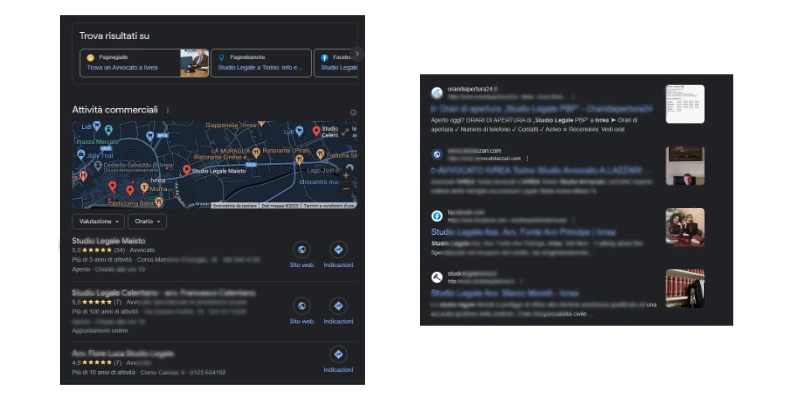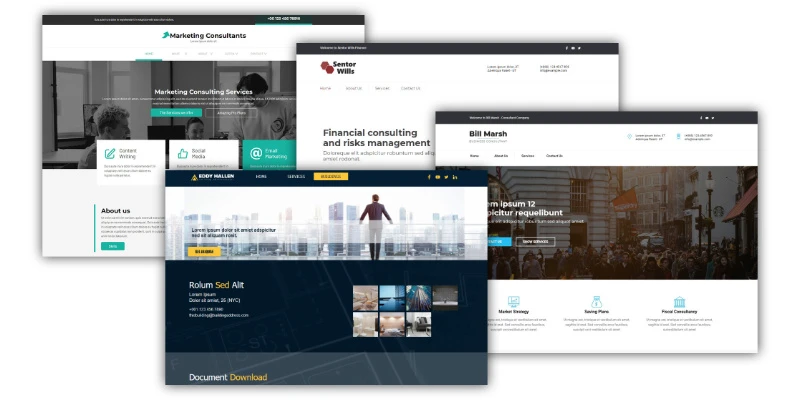The perfect website for your law firm
Published by Incomedia in Guides and Tips · Thursday 27 Apr 2023
“Judge, we’ll show the court that the defendant's argument doesn’t hold up. What he claims is not true — that he had no motive, didn’t have the time to do it and didn’t even really know how to do it. In reality, he had a motive, the time and the knowledge. If (as we have proven) he didn’t do so, then he’s guilty of not creating his own website.”
A bit too “Law & Order” for you? What can I say, I’ve always had a soft spot for legal series! However, the argument stands. I've heard too many lawyers claim that they either don't need a website or don't have the time or knowledge to create one. But that’s not true.
So, let's leave the lawyers sitting on the bench for a while longer, and we’ll start with arguments from the prosecution.
A website is a necessity, even for a lawyer
Let's put it this way — there’s fierce competition out there, and not even lawyers can afford to sleep.
Traditionally, they’ve always relied on word of mouth. But these days, we’re all used to looking for anything - from toothpicks to cars - on the internet. So in the event that we need legal advice or support, why wouldn’t we turn to it?
As users and prospective clients, through online searches, we expect to find lawyers or law firms are in our area, learn about the services they offer and see proof of their competence and reliability, etc. Basically, we want to understand who they are and if we can trust them.
It’s obvious, then, that the best thing for a lawyer or law firm to do is have their own website. Only then can they hope to intercept online searches, gain recognition as a competent professional, present their services - and if all goes well - acquire new clients.

All things considered, a website is the perfect tool for a lawyer to promote their practice, grow their reputation and, ultimately acquire new clients.
Legal websites? Yes, it can be done!
I feel an objection coming: “Sure, a website can be useful, but in the case of lawyers, one must take into account the American Bar Association’s information requirements regarding legal services.” It’s true, lawyers do need to be mindful of being “bar compliant”, which varies by state and specifies the way in which information can be shared with the public when it comes to professional services, establishing what can and cannot be done. Given the delicate nature of things and the repercussions it can have on people's lives, there are limits which need to be respected, but lawyers are not prohibited from having websites.
The American Bar Association requirements for legal websites can be found here.
As we can see from closer inspection, there are legal requirements that one needs to be aware of, but in reality, they’re not that difficult to comply with.
By including truthful, accurate and unambiguous communication on their websites, attorneys can successfully:
- comply with American Bar Association requirements.
- offer useful content.
- satisfy search engines like Google, enabling them to better position their pages.
Three significant benefits in one fell swoop. Not bad, huh?!
Creating the perfect legal website? Here’s how:
Having established the need and the fact that it can be done, we’ll now turn to figuring out how to create a truly effective legal website.
If, as we’ve already mentioned, a website is a calling card through which you present yourself as a credible professional and channel through which you gain new clients, you’ll need to pay close attention to these three elements:
Goals and structure
Many people fail to do so, but clearly identifying the goals you’re looking to achieve by putting a website online is essential for correctly addressing all the next steps.
In general, a lawyer or law firm will want to:
- reach customers within a specific area.
- increase their popularity and credibility.
Once you’re aware of the goals you’re looking to achieve, you can begin tackling the structure of your website, identifying the pages you want to put out there and organizing them into a logical and easily navigable menu.

Of course, things can vary according to specific needs, but there are pages that simply must be included on a legal website:
- Home Page: A home page should be seen as a kind of initial cover letter which presents the professional or the law firm, summarizing the essential points featured on the site.
- Who We Are: A “Who We Are” page is one of the most important pages, where lawyers can introduce themselves, discuss their experience and demonstrate their values, professionalism and competence.
- Services: This is another important page where you can list your areas of expertise along with the services you offer.
- Contact Information: This page is critical for providing potential clients with all the ways they can contact the firm.
- Ethics Code: This is where you explain the values you uphold and the responsibilities you keep.
There are other pages which may also prove to be extremely useful:
- Blog: This is the most appropriate place to regularly publish informative content for clients. It’s perfect for engaging your audience by demonstrating your expertise and is also important for SEO ranking.
- FAQ: Here, you’ll assemble your most frequently asked questions, which is useful for anticipating customer needs and streamlining your communication with them.
- What people are saying about us: This is the page where you present the opinions of clients, which are essential for building the firm’s online reputation.
Content and graphics
It’s obvious that a law firm's website must have a certain standing. Everything - from colors to graphical elements - should contribute to giving the page an identity and to communicating the values on which you’d like to position yourself. In any case, developing a professional design that’s capable of communicating strength and inspiring confidence doesn’t mean creating lifeless and boring pages. The desired result can be achieved through more lively and innovative solutions. Starting with a good template is often the best way to find a winning compromise.

Having solved the graphical layout of the pages, we can now turn to content. In this regard, there are two cautions that are important to bear in mind:
- No “Legalese”: A legal website is not for communicating with other lawyers but with people who have a problem to resolve, who are not necessarily comfortable with the jargon and technicalities of those who ruminate on laws and legislation. It’s best to try to be serious and professional but, at the same time, clear and empathetic.
- No poor quality images: If you want to create a trusting relationship with clients, you need to be be willing to put your face on it. A law firm's website doesn’t necessarily need a lot of pictures. They can be few, but the important thing is that they’re well done. It’s definitely worth investing in a professional service, so the firm and its lawyers are portrayed in the best way possible.

Optimization and local SEO
As we’ve already mentioned, if one of a legal website’s objectives is finding new potential clients, you’ll need to ensure that it ranks appropriately when people conduct specific searches through search engines.
This is why you shouldn’t neglect the SEO optimization of your pages. You can start with basic optimizations, such as choosing keywords to work with, using header and description tags correctly, offering quality content, creating an intuitive navigation structure, starting a blog and optimizing for mobile browsing.
Additionally, it pays to include a number of actions that fall under the label of "Local SEO".
The first (and most important) of these actions is to open a Google My Business account in a way that allows the lawyer or law firm to be found by clients in their geographical area.
Let’s look at an example. If a client needs a civil litigation attorney, they’ll probably narrow the field by looking for one that’s nearby. They’ll open up Google and type in “civil litigation attorney Milan” or "civil litigation attorney near me”.

Having a profile on Google My Business allows the attorney to intercept precisely these types of searches.
On the Google My Business tab of a legal website, the client will be able to see reviews left by other clients, services offered, the firm’s hours of operation, photos of the firm and any blog posts, etc.
The beauty of this Google service is that it’s free and easy to activate and keep updated.
Creating a legal website with WebSite X5
"Judge, the defendant claims he didn’t create a website because he’s not capable of doing so, nor does he have the time to do it. He’s lying! He may not know it, but he is!” What’s often overlooked is that creating a website can be a task within everyone's reach, even those who have neither programming knowledge nor a lot of time to devote to it. It's all about finding the right tool to use.
WebSite X5 is an easy and intuitive software. It’s configured as a guide to lead and support you in the creation of pages to be published online. The beauty is that, while being easy to use, it offers all the necessary features for creating high-quality websites, blogs and e-commerce sites that are optimized for SEO and 100% navigable from any device, whether desktop or mobile.
For a lawyer or law firm, WebSite X5 is a winning choice. They can create their own websites and update them as often as they’d like, without having to rely on a third party.

Starting from one of the available templates, the website will be ready to go sooner than you can imagine and with very little investment.
WebSite X5 also features an included hosting service with an automatic domain and free web space for one year.
So, you have no more alibis! If you’re a lawyer, and you don’t already have your own website, try WebSite X5 and begin creating your online presence.

